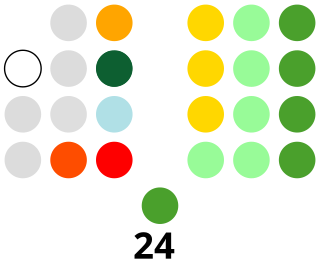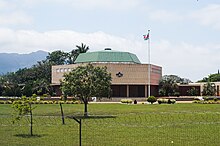
Eswatini, formally the Kingdom of Eswatini and also known by its former official name Swaziland and formerly the Kingdom of Swaziland, is a landlocked country in Southern Africa. It is bordered by Mozambique to its northeast and South Africa to its north, west, south, and southeast. At no more than 200 km (120 mi) north to south and 130 km (81 mi) east to west, Eswatini is one of the smallest countries in Africa; despite this, its climate and topography are diverse, ranging from a cool and mountainous highveld to a hot and dry lowveld.
A member of parliament (MP) is the representative in parliament of the people who live in their electoral district. In many countries with bicameral parliaments, this term refers only to members of the lower house since upper house members often have a different title. The terms congressman/congresswoman or deputy are equivalent terms used in other jurisdictions. The term parliamentarian is also sometimes used for members of parliament, but this may also be used to refer to unelected government officials with specific roles in a parliament and other expert advisers on parliamentary procedure such as the Senate parliamentarian in the United States. The term is also used to the characteristic of performing the duties of a member of a legislature, for example: "The two party leaders often disagreed on issues, but both were excellent parliamentarians and cooperated to get many good things done."

The Congress of the Philippines is the legislature of the national government of the Philippines. It is bicameral, composed of an upper body, the Senate, and a lower body, the House of Representatives, although colloquially, the term "Congress" commonly refers to just the latter. The Senate meets at the GSIS Building in Pasay, while the House of Representatives meets at the Batasang Pambansa in Quezon City, which also hosts joint sessions.

The Colorado General Assembly is the state legislature of the State of Colorado. It is a bicameral legislature consisting of the Senate and House of Representatives that was created by the 1876 state constitution. Its statutes are codified in the Colorado Revised Statutes (C.R.S.). The session laws are published in the Session Laws of Colorado.

The Missouri General Assembly is the state legislature of the U.S. state of Missouri. The bicameral General Assembly is composed of a 34-member Senate and a 163-member House of Representatives. Elections are conducted using first-past-the-post voting in single-member districts of roughly equal population. Members of both houses of the General Assembly are subject to term limits. Senators are limited to two four-year terms and representatives to four two-year terms, a total of 8 years for members of both houses. The General Assembly meets at the Missouri State Capitol in Jefferson City.

The Tennessee General Assembly (TNGA) is the state legislature of the U.S. state of Tennessee. It is a part-time bicameral legislature consisting of a Senate and a House of Representatives. The Speaker of the Senate carries the additional title and office of Lieutenant Governor of Tennessee. In addition to passing a budget for state government plus other legislation, the General Assembly appoints three state officers specified by the state constitution. It is also the initiating body in any process to amend the state's constitution.

The Parliament of Victoria is the bicameral legislature of the Australian state of Victoria that follows a Westminster-derived parliamentary system. It consists of the King, represented by the governor of Victoria, the Legislative Assembly and the Legislative Council. It has a fused executive drawn from members of both chambers. The parliament meets at Parliament House in the state capital Melbourne. The current Parliament was elected on 26 November 2022, sworn in on 20 December 2022 and is the 60th parliament in Victoria.

The Chamber of Deputies is the lower house of the bicameral Italian Parliament, the upper house being the Senate of the Republic. The two houses together form a perfect bicameral system, meaning they perform identical functions, but do so separately. The Chamber of Deputies has 400 seats, of which 392 are elected from Italian constituencies, and 8 from Italian citizens living abroad. Deputies are styled The Honourable and meet at Palazzo Montecitorio.

There are three types of elections in Nepal: elections to the federal parliament, elections to the provincial assemblies and elections to the local government. Within each of these categories, there may be by-elections as well as general elections. Currently three electoral systems are used: parallel voting for the House of Representatives and provincial assemblies, single transferable vote for the National Assembly, and first-past-the-post for local elections.

The Parliament of Eswatini is bicameral, consisting of a lower chamber and an upper one. Some of the members of both chambers are elected, while the rest are appointed by the King of Eswatini. Election is by secret ballot in a first-past-the-post system of voting. Members of both chambers serve for five-year terms. All candidates run on a non-partisan basis, as political parties are banned.

The Senate of Eswatini is the upper chamber of the country's bicameral Parliament. The Senate may debate or pass a bill, with the exception of a "money bill", which must first be introduced in the lower chamber, the House of Assembly.

The House of Representatives of Antigua and Barbuda is the lower chamber of the country's bicameral parliament. Each of the constituencies created in accordance with section 62 of the Constitution shall elect one representative to the House in a direct election in accordance with the procedures specified by or pursuant to any law, subject to the rules of the Constitution. Unless he is prohibited by law from registration as a voter for the purpose of electing a member of the House, every Commonwealth citizen who is eighteen years of age or older and who meets the requirements relating to residence or domicile in Antigua and Barbuda as prescribed by Parliament is entitled to be registered as such a voter in accordance with the provisions of any law in that regard, and no other person may be registered. Every person who is registered to vote in any constituency shall, unless prohibited from doing so by any law, be entitled to vote in accordance with the provisions of any law in that regard in any election of members of the House in that constituency. Voting is free and must be done by secret ballot in accordance with any rules that Parliament may impose during House member elections.

The Parliament of The Bahamas is the bicameral national parliament of the Commonwealth of The Bahamas. The parliament is formally made up of the sovereign, an appointed Senate, and an elected House of Assembly. It currently sits at the Bahamian Parliament Building in Nassau, the national capital.

The House of Representatives is the lower house of the National Assembly of Thailand, the legislative branch of the Thai government. The system of government of Thailand is that of a constitutional monarchy and a parliamentary democracy. The system of the Thai legislative branch is modelled after the Westminster system. The House of Representatives has 500 members, of which 400 are elected through single member constituency elections, while the other 100 are chosen through party lists parallel voting.

In Eswatini, an inkhundla is an administrative subdivision smaller than a district but larger than an umphakatsi. There are 55 tinkhundla in Eswatini: 14 in Hhohho District, 11 in Lubombo District, 16 in Manzini District, and 14 in Shishelweni District. According to the constitution of Eswatini, the government for Eswatini is a democratic, participatory, tinkhundla-based system that emphasizes devolution of state power from central government to tinkhundla areas and individual merit as a basis for election or appointment to public office. The system is non-partisan since the constitution does not recognize political parties, although section 25 of the constitution allows for open freedom of assembly and association. Each inkhundla elects one representative to the House of Assembly of Eswatini, the lower chamber of the bicameral parliament (Libandla). The same trend is applied in local government elections. This governing system was designed by King Sobhuza II with the assistance of political scholars and lawyers. It came to effect in 1978 and was adjusted in the early 1990s.

The Federal Parliament of Nepal is the bicameral federal and supreme legislature of Nepal established in 2018. It consists of the National Assembly and the House of Representatives as parallel houses.

The National Assembly of Thailand is the bicameral legislative branch of the government of Thailand. It convenes in the Sappaya-Sapasathan, Dusit District, Bangkok.

The Tamil Nadu Legislative Assembly is the unicameral legislature of the Indian state of Tamil Nadu. It has a strength of 234 members, all of whom are democratically elected using the first-past-the-post system. The presiding officer of the Assembly is the Speaker. The term of the Assembly is five years, unless dissolved earlier.

The Swazi Democratic Party, also known by its abbreviation SWADEPA, is a political party in Eswatini led by its president Jan Sithole. SWADEPA was established in 2011 and took part in the 2013 parliamentary elections in Swaziland by putting up candidates running as individuals.

Government of the Kingdom of Eswatini is the union government created by the constitution of Eswatini where the monarch holds supreme executive, legislative, and judicial powers. The Ngwenyama (lion) is a hereditary leader, rules the country, with the assistance of a council of ministers and a national legislature.


















